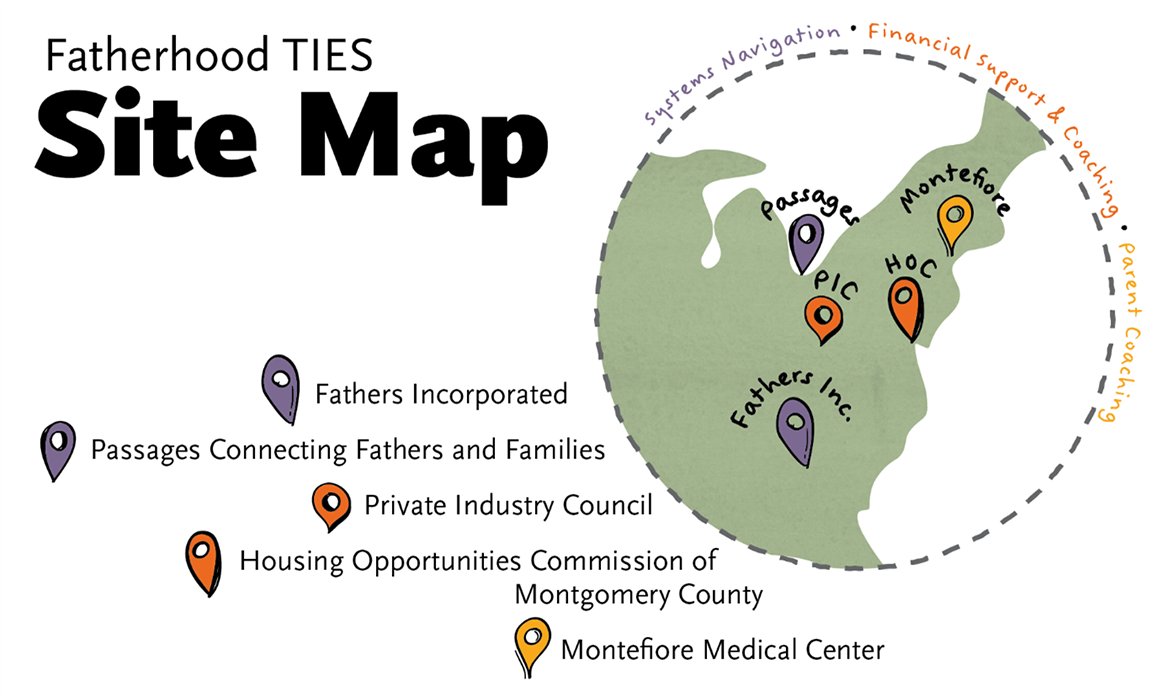The Testing Identified Elements for Success in Fatherhood Programs (Fatherhood TIES)

Overview
Fatherhood programs are designed to support fathers’ connections with their children, improve fathers’ relationships with their partners or co-parents, and strengthen fathers’ economic wellbeing. These programs usually offer workshops and case management services for dads on a range of topics, including parenting strategies to strengthen child-father relationships, skills to improve co-parenting relationships, strategies for obtaining steady employment, and support in navigating other life or family challenges they might experience. Acknowledging the important roles that fathers play in the wellbeing of their children, families, and communities, the federal government invests tens of millions in fatherhood programs every year. However, studies to date demonstrate wide variability in effectiveness.
The Testing Identified Elements for Success in Fatherhood Programs (Fatherhood TIES) project is an attempt to identify which elements of these programs produce positive effects. Researchers from MDRC, MEF Associates and Abt Global have come together to answer a two-part question: What are the components of fatherhood programs that lead to better outcomes for the fathers who take part in them, and how can we best implement these components in existing programs? In identifying which of these “core components” are most effective and how they are successfully integrated with services, our research team aims to improve outcomes for children, families, and communities as well as individual dads.
Additional Project Details
Agenda, Scope, and Goals
Through analyzing lessons from earlier studies and program participation datasets, and by actively engaging an advisory committee of fathers, fatherhood program staff, and other subject matter experts, the research team has defined and prioritized which core components to test: individualized supports. Fatherhood TIES is now collaborating with staff from five fatherhood programs and up to 3,000 of their participants to put these core components into practice and collect data on the core components’ effects on fathers’ outcomes.
After analyzing and synthesizing findings, the team will share lessons by publishing reports, briefs, and how-to guides that highlight the perspectives of fathers and staff and help policymakers, researchers, and program managers apply these lessons. Fatherhood TIES also publishes interim reports on our research design and process, to assist those undertaking similar work, and we use our website and social media to provide updates to the public.
Design, Sites, and Data Sources
Now that the study team has gathered information from prior studies and datasets, Fatherhood TIES is proceeding to the evaluation phase. This includes an impact study as well as an implementation study, as described below:
- The impact study is using randomized controlled trials to rigorously evaluate the effects of individualized supports — the core component identified in earlier phases as resulting in positive outcomes for fathers and their families. Specific outcomes of interest include program engagement, father-child relationship quality, co-parenting relationship quality, and issues related to child support, food insecurity, material hardship.
- The implementation study is describing how individualized supports are being integrated with existing services and comparing the supports provided to fathers randomly assigned to test groups to the supports provided to those receiving standard services. The research team continues to interview participants and program staff to identify implementation challenges. The study will provide lessons for the field on key elements for successful program implementation and barriers to overcome when implementing individualized services.
Our different site partners are implementing different individualized services:
- Fathers Incorporated (of Dunwoody, GA) and Passages Connecting Fathers and Families (of Cleveland, OH): concierge-style supports for navigating systems and processes that affect fathers’ access to their children, including the child welfare system, child support system, and family court proceedings.
- Housing Opportunities Commission’s Fatherhood Initiative program (of Gaithersburg, MD) and Private Industry Council’s Dads Matter program (of Easton, PA): financial support to fathers of $500 per month for three months and financial coaching tailored to the needs of individuals.
- Montefiore Medical Center’s HERO Dads program (of Bronx, NY): one-on-one parenting coaching to address issues in fathers’ relationships with their children and romantic partners.

Featured Work
Identifying Core Components in Fatherhood Programs Through a Multimethod Analysis Approach







